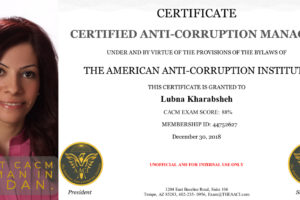December 23, 2022
Technical Staff
Integrity is an important quality that every leader should possess. It involves being honest, consistent, and ethical in one’s actions and decisions. A leader with integrity inspires trust and respect from their team and colleagues and creates a positive and productive work environment. But beyond just building trust and respect, integrity is also essential for effective leadership. When leaders act with integrity, they set an example for others to follow and create a culture of honesty and accountability. This blog post will explore the importance of integrity in leadership and fighting corruption and how it can positively impact the individual leader and the team or organization they lead.
One of the main reasons why integrity is so important in leadership is because it helps to build trust and respect. When leaders consistently act with honesty and integrity, they demonstrate to their team that they can be relied upon and that their words and actions align. This creates a sense of trust and respect within the group, leading to better communication, collaboration, and overall performance.
On the other hand, a leader who lacks integrity can quickly lose the trust and respect of their team. Suppose a leader is not honest or ethical in their actions and decisions. In that case, it can erode the trust and respect of the team, leading to a breakdown in communication and collaboration. In the worst case, a lack of integrity can lead to a toxic work environment and low morale.
Another critical aspect of integrity in leadership is setting an example for others to follow. Leaders who act with integrity set a standard for the rest of the team to emulate. This can create a culture of honesty and accountability within the organization, leading to better decision-making and a more positive work environment.
Integrity is also essential for effective decision-making. When leaders are honest and ethical in their actions, they are more likely to make sound and fair decisions that are in the best interests of the team and organization. This can lead to better outcomes and a more positive reputation for the group or organization.
Therefore, integrity is an essential quality for any leader to possess. It helps to build trust and respect, sets an example for others to follow, and is vital for effective decision-making. By acting with integrity, leaders can create a positive and productive work environment and achieve better outcomes for their team or organization.
Fighting Corruption
Another important aspect of integrity in leadership is the role it plays in the fight against corruption. Corruption can take many forms, from accepting bribes to manipulating policies and systems for personal gain. It undermines trust and fairness in society and can have far-reaching negative consequences.
A leader with integrity is less likely to engage in corrupt practices and is more likely to speak out against them. By setting an example of honesty and ethical behavior, a leader with integrity can help to create a culture within the organization that is intolerant of corruption.
In addition, a leader with integrity is more likely to have the courage and moral fortitude to take a stand against corruption, even if it is not an easy or popular choice. This can help to create a more transparent and accountable system, which is essential for effective and fair governance.
Overall, the relationship between integrity and the fight against corruption is crucial. A leader with integrity is more likely to create a culture that is intolerant of corruption and is better equipped to take a stand against it, ultimately leading to a more transparent and accountable system.
Photo by Micah Eleazar: https://www.pexels.com/photo/people-sitting-on-chair-in-front-of-table-10498800/











































